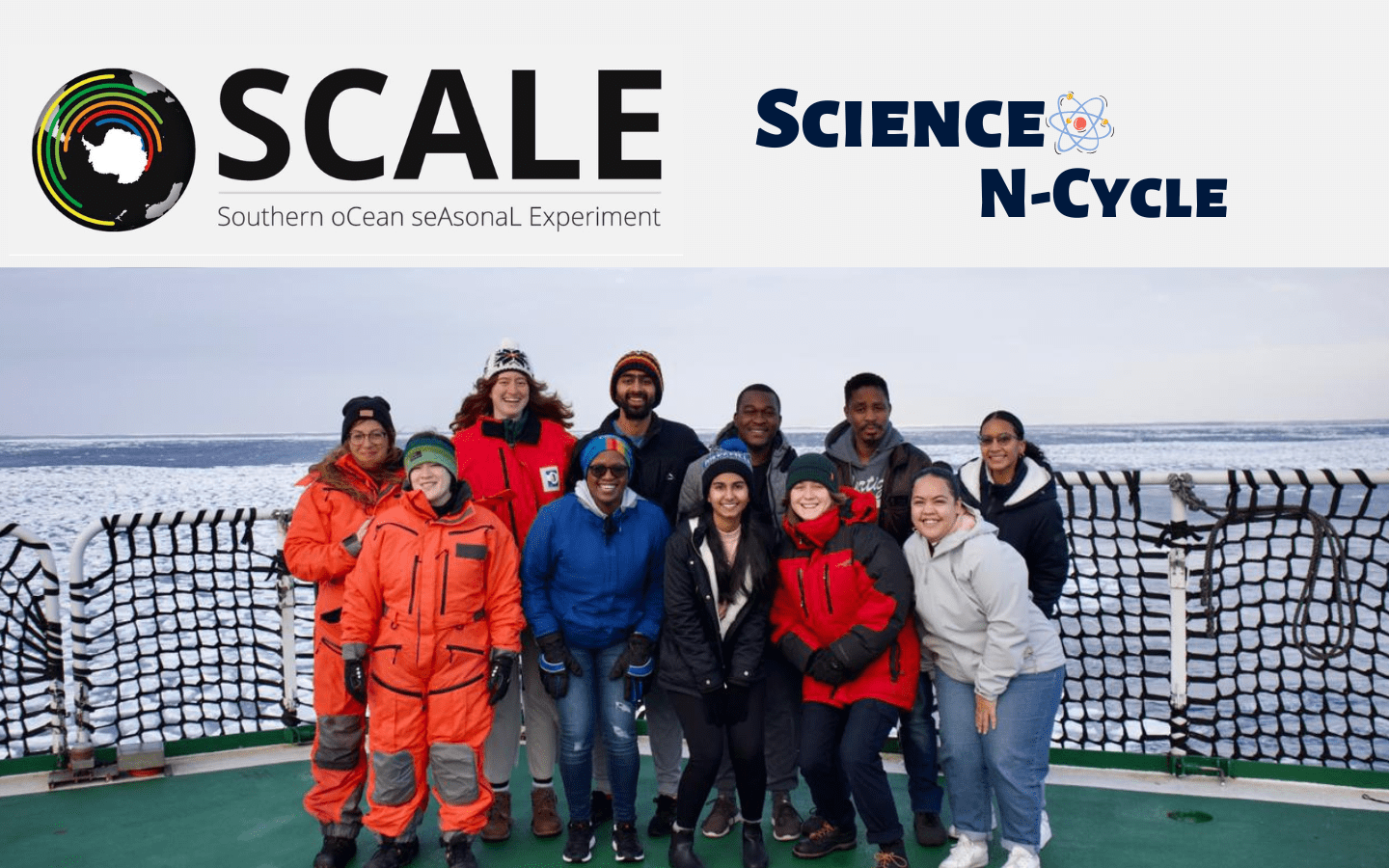
N-Cycle team onboard the S.A. Agulhas II. Back (left to right) Letizia Tedesco, Christina Monteiro, Brishan Kalyan, Nkateko Maholobela, Mhlangabezi Mdutyana, Aldean Esau; (front) Lumi Haraguchi, Sizwekazi Yapi, Sadiyah Rawat, Amelia Deary, Venecia van Balla.
| TEAM | N-CYCLE | |
|---|---|---|
| Project name | Nitrogen cycle in the Southern Ocean | |
| Principal Investigator 1 | Sarah Fawcett | University of Cape Town (UCT) |
| Principal Investigator 2 | David Walker | Cape Peninsula University of Technology (CPUT) |
Onboard N-CYCLE team members:
| Team Member | Role | Affiliation |
|---|---|---|
| Mhlangabezi Mdutyana | Team Leader | UCT |
| Amelia Deary | MSc | UCT |
| Sizwekazi Yapi | MSc | UCT |
| Christina Monteiro | Honours | UCT |
| Sadiyah Rawat | Honours | UCT |
| Lumi Haraguchi | Postdoc | SYKE, Finland |
| Aldean Esau | Honours | CPUT |
| Venecia van Balla | Honours | CPUT |
| Nkateko Maholobela | Honours | CPUT |
| Brishan Kalyan | MSc | NMU |
| Letizia Tedesco | Researcher | SYKE, Finland |
The project description as per the sailing orders for the SCALE Winter Cruise of 2022:
Thirty years ago, John Martin proposed that the high nitrate concentrations left unconsumed in Southern Ocean (SO) surface waters result from iron-limitation of phytoplankton growth. Extensive culture and (CPUT) fieldwork has since confirmed the central role of iron in photosynthesis and nitrate assimilation. Because of the implications for CO2, most studies of coupled iron and nitrogen (N) cycling have focused on nitrate assimilation, with little attention paid to the role of iron in mixed-layer N (re-)cycling. Our preliminary data suggest that iron availability exerts a strong control on N regeneration; if verified, this has implications for our mechanistic understanding of the N cycle, now and in the future when the iron supply to the surface SO is predicted to rise.
On this cruise, we plan to interrogate the role of iron in the upper SO N cycle at high resolution through extensive iron amendment experiments. We will also examine the composition and functioning of the associated planktonic (auto-, mixo- and heterotrophic) community. Diverse aspects of Southern Ocean physics and chemistry are already experiencing climate-induced changes; a major motivation for this work is to develop expectations for Southern Ocean fertility and ecology in response to such changes. This work is also relevant for the nutrient supply to the low-latitude ocean, which is controlled by both the extent of nutrient uptake in Southern Ocean surface waters and the ratios in which these nutrients are consumed; the latter is strongly affected by iron availability and plankton species composition.
Cape Peninsula University of Technology students, under the supervision of Dr David Walker, will be investigating chlorophyll-a concentrations and phytoplankton assemblages at all the CTD and process stations, as well as in ice core samples.
Follow Dr Fawcett on Twitter and check out the Marine Biogeochemistry Lab website (links below).
Text and images supplied by the N-Cycle team and Kurt Martin (SAPRI Trainee)
Anche Louw, Antarctic Legacy of South Africa, 27 July 2022.






